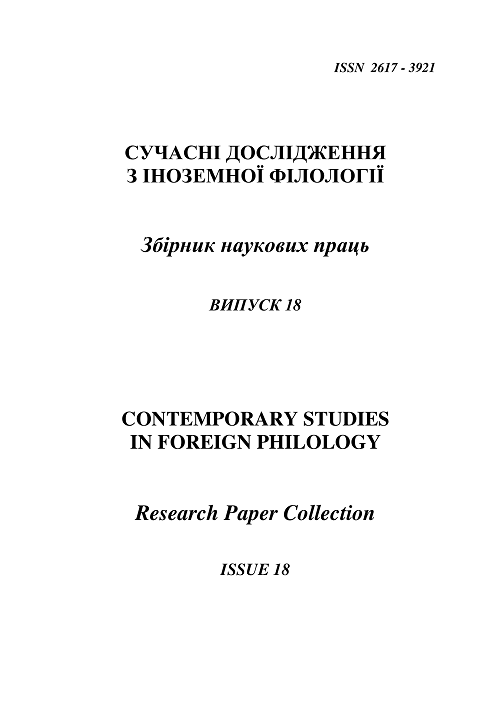The notion of communicative competence in the context of foreign language learning
DOI:
https://doi.org/10.24144/2617-3921.2020.18.330-338Анотація
The article is devoted to the coverage and analysis of the views of foreign and domestic scholars and the main provisions of competence as a structural component of foreign language communicative competence. The essence of communicative concepts in the context of mastering foreign languages is revealed. The analysis and comparison of the structure and definition of communicative competence between researches is carried out. The article describes the concept of "communicative competence", as well as its structure. The species proposed by both foreign and domestic researchers are highlighted. An analysis of the concept of "communication strategy". The structure and concept of foreign language communicative competence as a set of knowledge, skills and abilities used during professional activity are analyzed. This aspect is also taken into account for self-education and development in this case of future professionals. The main purpose of learning foreign languages is to master foreign speech activity. In the process of learning foreign languages, it is important to be aware of the difference between such concepts as language (sign system), speech (the process of communication through language) and speech activity (unity of language and speech). Components of communicative competence include the ability to understand and overcome communication barriers. These barriers can arise, for example, in the absence of understanding of the communication situation due to different views, visions (social, political, religious, professional). In addition, there is still a great need for the study of professionally-oriented foreign language communication, because it is the basis in the process of interaction with future professionals. The relevance of the research topic is determined by the fact that the development of modern society, networking and cross-border cooperation is increasingly dependent on knowledge of foreign languages. As a result, foreign language communication and cooperation between different countries of the world requires updating and significant changes in methods and approaches to learning foreign languages.
Keywords: communicative competence, components, structure, functions, strategies, foreign language communication.
Посилання
Андреева Г. М. Социальная психология: учебник для вузов: 5-е изд., испр, и доп., М.: Аспект Пресс, 2008. 365 с.
Бодалев А. А. Личность и общение : Избранные психологические труды / 2-е изд., перераб. М.: Международная педагогическая академия, 1995.328 с.
Гез Н.И.Формирование коммуникативной омпетенции как объект зарубежных методических исследований. Иностранные языки в школе. Москва, 1985. №2. С. 17 – 24.
Dyck T.A. van, Kinch V. Strategies for understanding a coherent text. New in Foreign Linguistics. M .: Progress,1988. Issue 23. P.153-211.
Hadley A.O. English in context: textbook. way. Illinois: Heinle&Heinle, 1993. P. 79–86.
Hymes D.H. On communicative competence. Philadelphia: University of Pennsylvania Press, 1971. 213 p.
Карпова Л.Г. Формування професійної компетентності вчителя загальноосвітньої школи: дис. ... канд. пед. наук: 13.00.04 / Харківський держ. педагогічний ун-т ім. Г.С.Сковороди. Харків, 2003. 207 с.
Колодько Т.М. Формування соціокультурної компетенції майбутніх учителів іноземних мов у вищих педагогічних навчальних закладах: автореф. дис. канд. пед. наук: 13.00.04/ Нац пед. ун-т ім. М. П. Драгоманова. Київ, 2005. – 24 с.
Ніколаєва С. Ю. Цілі навчання іноземних мов в аспекті компетентісного підходу. Іноземні мови. Київ, 2010. № 2. C. 11–58.
Пассов Е.И. Культурообразная модель профессиональной подготовки учителя: философия, содержание, реализация. Иностранные языки. Москва, 2002. №4. С. 18–21.
Садохин А.П. Межкультурная коммуникация: учебное пособие М. : Альфа – М : ИНФРА, 2004. 288 с.
Swain M., Сanale M. Theoretical basis of communicative approaches in the process of teaching a second foreign language: applied linguistics. Oxford: Oxford University, 2002. 47 p.
##submission.downloads##
Номер
Розділ
Ліцензія
Автори, які публікуються у цьому журналі, погоджуються з наступними умовами:
- Автори залишають за собою право на авторство своєї роботи та передають журналу право першої публікації цієї роботи на умовах ліцензії Creative Commons Attribution License, котра дозволяє іншим особам вільно розповсюджувати опубліковану роботу з обов'язковим посиланням на авторів оригінальної роботи та першу публікацію роботи у цьому журналі.
- Автори мають право укладати самостійні додаткові угоди щодо неексклюзивного розповсюдження роботи у тому вигляді, в якому вона була опублікована цим журналом (наприклад, розміщувати роботу в електронному сховищі установи або публікувати у складі монографії), за умови збереження посилання на першу публікацію роботи у цьому журналі.
- Політика журналу дозволяє і заохочує розміщення авторами в мережі Інтернет (наприклад, у сховищах установ або на особистих веб-сайтах) рукопису роботи, як до подання цього рукопису до редакції, так і під час його редакційного опрацювання, оскільки це сприяє виникненню продуктивної наукової дискусії та позитивно позначається на оперативності та динаміці цитування опублікованої роботи (див. The Effect of Open Access).

